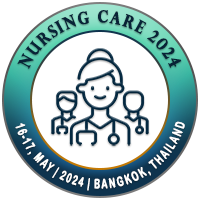
Ling-Hsin Ko
Tungs’Taichung Metro Harbor Hospital, Taiwan, TaiwanTitle: Review of risk factors of occupational burnout among nurses based on ecological system theory
Abstract
Background and Objectives: Occupational burnout has a great threaten among healthcare workers with a highest prevalence in the group of nurses and results into physical and psychological problems also brings into lower work performance. However, risk factors of occupational burnout are multi-dimensional and the literature review are not well discussed nor well organized.
Methods: This review applied the Ecological System Theory to analyze occupational burnout among nurses within the five contexts of microsystem of individual, mesosystem of work-family conflicts, exosystem of containing community structures, marcrosystem of belief and values representing the cultural feature, and chronosystem of changes occurring over countries and over time.
Results: Regarding the Ecological System Theory, risk factors were analyzed and followed from microsystem extended to chronosystem which are job nature of nurses related to long working hour and inadequate shifts, hard to attend family gatherings, inadequate daily patient-nurse ratio, culture stigma of not seeking mental health care actively, and long-term exposure of dramatically global health events, respectively.
Conclusions: From this review, we understand that occupational burnout is a chronic process in which people have interactions with the surrounding environments. Each level of the ecological system can be with respect to risk factor, and it also could be a preventive factor for nurses. In the case of occupational burnout protection, increasing awareness by questionnaires or self-screen tools of occupational burnout could be the first assessment among any healthcare workers. Following by support from supervisors in working place, policy revision for patient-nurse ratio and rotating shifts, developing specific educational and psychological programs for cultural stigma, and early warning risk detection in pandemic events. Therefore, selfawareness detection, well-developed mental health programs and resilience build-up are suggested in the future research.
Keywords: nurse, occupational burnout, ecological system theory
Biography
Ling-Hsin Ko currently is pursuing her phD degree from National Taiwan University in Taiwan. She is also a Cardiovascular nurse practitioner and has worked at Cardiovascular field nearly 20 years. Meanwhile, she is also a Usui Reiki teacher and Aromatherapist of National Association for Holistic Aromatherapist (NAHA). Her study is focused on combing modern Western medicine with Complementary and Alternative Medicine (CAM) for improvement of physical and psychological health, especially on stress, occupational burnout, and sleep disturbance.

